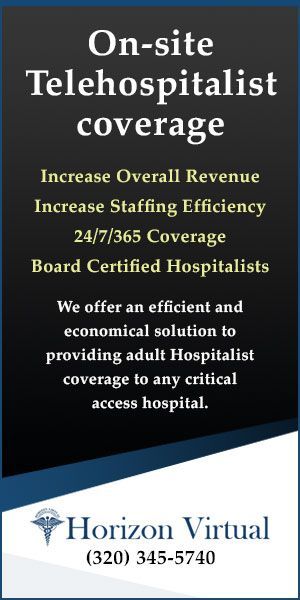Capsules
Fairview Declines Automatic Renewal of U of M Contract
Citing threats to its financial viability, Fairview Health System recently announced it was activating a non-automatic renewal clause in its current contract with the University of Minnesota. According to Fairview president and CEO James Hereford, the partnership was set to automatically renew for another ten years at the end of 2026, unless notice was provided by Dec. 31 of this year. Fairview will, however, attempt to renegotiate a new contract. The organizations have worked together on the M Health Fairview brand since 2018 as a partnership between the university, University of Minnesota Physicians and Fairview. Fairview claims to have invested over $1 billion to upgrade on-campus facilities, as well as hundreds of millions toward teaching and research at the medical school. Fairview posted operating losses throughout the pandemic and reported losing $315 million in 2022. Fairview vice president of communications, Joe Campbell, said, “M Health Fairview is the same today and will be tomorrow. All this is is an opportunity for both Fairview and the University of Minnesota to step back and chart our new path forward. We want to find a path forward with the University of Minnesota that ultimately leaves both organizations in a better place.” Earlier this year, the medical school released plans detailing construction of a new $1 billion campus-based hospital as an important part of maintaining its role as a national top tier medical school and medical research leader. The current relationship with Fairview poses several significant stumbling blocks to the construction project. In response to the Fairview announcement, the U of M released a statement noting, “We have previously said, as has Fairview, that our current agreement would have to change for the future. Fairview’s announcement today simply reaffirms those statements.” Although Fairview recently cut 250 jobs they specifically stated that the new notification won’t result in job losses and it doesn’t dissolve the M Health Fairview brand. Currently M Health Fairview operates ten hospitals and ambulatory centers and more than 60 clinics across the Twin Cities and Northeastern Minnesota.
Medicare Releases Lowered Payment Schedule
Medicare recently released its 2024 physician payment schedule, revealing a disturbing ongoing trend toward making Medicare unsustainable for patients and physicians. The new schedule includes a downward adjustment of 3.4%, on top of the 2% payment reduction in 2023. At the same time, the payment schedule confirms the Medicare Economic Index (MEI) increase at 4.6%, the highest this century and on top of last year’s 3.8%. MEI is the government measure of inflation in medical practice costs. The American Medical Association (AMA) notes, “This is a recipe for financial instability. Patients and physicians will wonder why such thin gruel is being served. Physicians routinely have faced cuts in the last two decades. Yet, there is nothing routine about the past few years. Physicians have faced the COVID pandemic and subsequent burnout. They have seen the costs soar for running a medical practice, while Medicare payment updates have offered too little relief.” Reduced reimbursement creates declining revenues, which in the face of steep cost increases disproportionately affect small, independent and rural physician practices, as well as those treating low-income or other historically minoritized or marginalized patient communities. Adjusted for inflation, Medicare physician payment already has effectively declined 26% from 2001 to 2023 before additional inflation and these cuts are factored in. Medicare reform is increasingly important for seniors and people with disabilities facing the prospect of disappearing access. In March, the Medicare Payment Advisory Commission (MedPAC) recommended a physician payment update tied to the MEI for the first time. In April, a bipartisan group of House members introduced a bill that would provide annual inflation updates to the Medicare payment schedule based on the MEI. The AMA and other physician advocacy groups are strongly urging Congress to advance this legislation. As part of the AMA’s Recovery Plan for America’s Physicians, it has developed a set of principles to guide efforts on Medicare physician payment reform aimed at establishing a rational Medicare physician payment system that provides financial stability through positive annual payment updates, improves the financial viability of physician practices and eases administrative burdens.”
UMN SPH Opens Cannabis Research Center
The University of Minnesota (UMN) School of Public Health (SPH) recently announcing the opening of its new Cannabis Research Center (CRC). The center will assess the impact of adult-use cannabis legalization and help inform future cannabis policies and practices across the state. Governor Tim Walz signed H. F. 100 into law in May, legalizing adult-use cannabis in Minnesota. To create a strong research infrastructure to study how cannabis is used and how it affects different Minnesota populations and communities, legislators included in the bill a $2.5 million annual appropriation from the cannabis sales tax to establish the CRC.
Information on the impacts of adult-use cannabis legalization is limited and inconsistent, due largely to the lack of formalized evaluations, robust data sets and strong research programs. CRC will fill this gap in Minnesota’s public health infrastructure by collaborating with organizations, agencies and people in the state on research to advance our understanding of the health effects of cannabis, including its impact on underage users and how it interacts with related substances, such as opioids and alcohol. CRC will also explore how adult-use cannabis legalization affects health equity and public safety. SPH professor Traci Toomey, a public health policy expert with a particular focus in substance-use control policies, will serve as the CRC’s inaugural director. “We’re extremely grateful to the Minnesota Legislature and Gov. Walz for their leadership and support in creating Minnesota’s first-ever research center focused on cannabis,” said Toomey. “I am excited for the opportunity to lead the Cannabis Research Center and, alongside my colleagues at the School of Public Health, to conduct innovative research on the health effects of adult-use cannabis legalization on people and communities across the state, including prevention and treatment of substance-use disorders, equity issues, education and decriminalization.” SPH Interim Dean Timothy Beebe said, “As Minnesota’s only school of public health, we are honored to uphold our state’s considerable reputation as a leader in health innovation and research. We’re thankful to state leaders for giving us this opportunity to help ensure the best possible health outcomes for all Minnesotans.”
HealthPartners to Build New $400 Million Stillwater Hospital
HealthPartners recently announced it is moving forward with construction of a $400 million hospital campus in Stillwater. The new facility will include access to advanced critical care and specialized centers for cardiology, oncology and orthopedic services. The project has been planned for years but was delayed by the COVID pandemic. The 68-acre campus will be located at Highway 36 and Manning Avenue on land acquired in 2017. HealthPartners currently provides hospital services to the St. Croix Valley area through the 97-bed Lakeview Hospital, which employs about 1,100 people. Despite several expansions, rapid population growth is exceeding hospital capacity. Emergency room visits are a good capacity indicator and they project to over 20,000 visits this year, up from 16,000 five years ago. Lakeview Hospital President Brandi Lunneborg said, “The east metro and western Wisconsin communities we serve continue to grow and change. For example, the percent of people over age 65 is projected to increase 20% over the next five years. The need for coordinated services for chronic illnesses such as cardiology, cancer and orthopedic care will also increase.” Andrea Walsh, president and CEO of HealthPartners, noted, “Lakeview Hospital has served our communities well for decades. As we look ahead, our new health campus will allow us to keep pace with the needs of a growing, changing community. With the community’s input, we plan to create a state-of-the art campus that is ready for the future.” Speaking further on the new facility Lunneborg said, “It will be a gateway into Stillwater as people come into the community. It also has wonderful natural attributes, and we know that nature and health and healing go hand in hand, so we’re extremely excited about what that will bring to enhance what we offer at the hospital. Chicago-based architects HKS will design the new campus in partnership with local architects, BWBR, and engineering firms Dunham, ERA and Loucks. The hospital is projected to open in late 2027 or early 2028.
Avera Receives Grant to Train Sexual Assault Nurse Examiners
Avera Health has recently received nearly $1 million in grant funding from the U.S. Department of Justice to enhance the availability of trained sexual assault nurse examiners (SANEs) for victims of interpersonal violence. “This grant will enhance access to SANE-trained personnel, especially in rural areas,” said Rachael Sherard, senior vice president for rural health at Avera. “Avera is continually seeking out new collaborations to improve access to vital heath care services in rural areas; this is just one example.” The grant funds training virtually and in person as well as a SANE preceptorship program and trauma-specific training for mental health professionals. Another aspect of the grant is offering additional support services and resources to victims. Advancing SANE resources for rural victims in the Upper Midwest will make SANEs more available at numerous sites, including rural locations, both in person and via telemedicine. It includes more access to training opportunities for medical personnel who care for victims of interpersonal violence, as well as those nurses who aspire to become SANEs. “Trained SANEs are absolutely essential in advocating and caring for victims of crimes like sexual assault and human trafficking. SANEs help victims navigate through this tragedy, providing essential post-assault care and connection with community resources and support services. For those victims who wish to have an evidence collection kit collected, we help ensure that evidence is gathered properly; evidence that’s valuable when seeking justice for victims,” said Jen Canton, SANE supervisor at Avera and program director for this grant project. Project sites include Sioux Falls, Yankton, Mitchell, Pierre and Aberdeen, South Dakota, and Marshall, Minnesota. Additional sites will be selected each year, including partners from Indian Health Service (IHS) and hospitals in neighboring states. “We are excited about this program that will directly benefit victims of sexual assault in the rural Midwest, from both tribal and non-tribal communities,” Canton said. Additionally, rural hospitals and their staff will benefit from the 24/7 access to sexual assault nurse examiners, as will local law enforcement and others involved in seeking justice for victims.
MDH Staffing African American Health State Advisory Council
The Minnesota Department of Health (MDH) is now filling positions for the newly created African American Health State Advisory Council. The council will work closely with the new Office of African American Health and play a key role in shaping the African American Health Special Emphasis Grant Program passed by the Minnesota Legislature in 2023. The Office of African American Health was created to address the unique public health needs of African American Minnesotans. It will work to develop solutions and systems to address identified health disparities of African American Minnesotans arising from a context of cumulative and historical discrimination and disadvantages in multiple systems, including but not limited to housing, education, employment, gun violence, incarceration, environmental factors and health care discrimination. The council will engage in the following activities:
- Identify health disparities and contributing factors found in African American communities.
- Recommend review of any statutes, rules or administrative policies or practices to the commissioner of health that would address African American health disparities.
- Recommend policies and strategies to the commissioner of health to address disparities specifically affecting African American health.
- Submit a report to the commissioner of health that summarizes council activities and identifies and makes recommendations to address those disparities.
“In order to improve African American health and well-being, MDH must address the upstream social factors that disproportionately impact U.S.-born Black Minnesotans,” said the assistant commissioner of the Health Equity Bureau, Halkeno Tura. “This council and the Office of African American Health are key steps in helping us develop feasible strategies to interrupt the complex, intersecting pathways that contribute to downstream health outcomes disproportionately affecting Black Minnesotans.” As outlined in Minnesota statute, the council will include 12 to 20 members representing or serving the African American community. By January 15, 2025, and every two years thereafter, the commissioner of health shall report to the chairs and ranking minority members of the legislative committees with primary jurisdiction over health policy and finance on the work accomplished by the Office of African American Health during the previous two years and on goals of the office for the upcoming two years.
MORE STORIES IN THIS ISSUE
cover story one
A Crisis in Home Health Direct Care: The Minnesota Solutions Model
By Jesse Bethke Gomez, MMA
cover story two
The MN 2035 Plan: Improving Public Health
By Thomas E. Kottke, MD, and Clarence Jones















